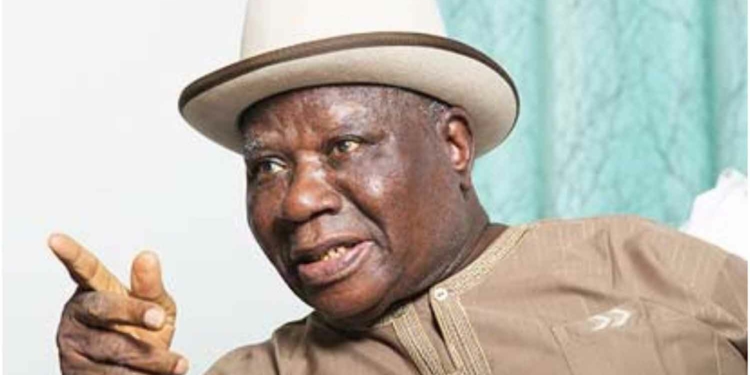- Clark made the assertion in his recently published autobiography, Brutally Frank.
- In the book, Clark disclosed how the British colonial government used corrupt means and divide and rule to take over the Niger Delta
Former Federal Commissioner for Information and South South Leader, Chief Edwin Clark says all manner of corruption that Nigeria is grappling with today dates back to the incursion of the British into the country’s political and socio-economic life.
Clark made the assertion in his recently published autobiography, Brutally Frank. He stated that corruption is the great tragedy of Nigeria.
The book chronicles the journey of Clark as a classroom teacher, a Commissioner, a Minister, a Senator and a National activist spanning over seven decades.
In the book, Clark disclosed how the British colonial government used corrupt means and divide and rule to take over the Niger Delta.
Clark in the book said, “It is most regrettable and disappointing that corruption has eaten so deep into all facets of the Federal Government, to the extent that those we expected to eradicate corruption in their States and the Attorney-General under whom anti-corruption agencies operate, seem to be involved in scandalous practices over the Paris Club repayment of loan. A situation whereby some lawyers bargain with the Governors Forum as to how much they are entitled to in the repayment being made to them by the local government even though it is not possible to follow all the exchanges.
“It can rightly be said that the British colonial government was the first to introduce corruption to Nigeria in their scramble for Africa with other European countries after the Berlin Conference of 1884 through the traditional chiefs who acted as their agents. A typical case which affected my people is the role played by the British colonial government in using a powerful local chief in the Niger Delta, Chief Dore Numa, to remove other local chiefs from office when they refused to cooperate with the colonial government. A good example is Chief Nana Olomu of Koko Benin River. An expedition war was staged Bainst him in 1892 and he was later deported to Accra in the Gold Coast.
“This gave the colonial government uninterrupted entry into the interior land.
“Similarly, they used the same Chief Dore Numa against His Royal Highness, Oba Ovonramwen Nogbaisi of Benin Kingdom in 1897. He too was deported, but this time to Calabar, where he spent the rest of his life. This gave the British Oficers room to loot local artifacts and monuments. The looting of artefacts in 1897 was carried out by Capt. Philip, who further sold them to various countries in Europe. It is remarkable that today, a lot of these artifacts sold to Germany are being voluntarily returned by the German government after 124 years.
“The same British government rewarded Chief Dore Numa by making him a Paramount Chief of the Itsekiri people and the political agent of the British.
“This gave him enormous power over others. The British government used him to acquire extensive land in Warri township which was leased to prominent businessmen in the same Warri township. In fact, there was much to be said of British corrupt practices as in the famous 1925 case of Omenta v. Chief Dore Numa – a case which Chief Omenta brought in defence of Agbasa people. Chief Dore Numa had fraudulently leased to the British a portion of Agbasa land. An intelligence report stated that the case went on to Appeal in 1934; whereas, Chief Dore Numa had died in 1932.
“It was expected, based on the foregoing, that this trend of corrupt practices would be handed over to Nigerians when eventually they became part of government.
“There was one of such alleged corruption cases involving the Premier of Eastern Nigeria, Rt. Hon. Dr. Nnamdi Azikiwe, the foremost politician at the time. A Nigerian Tribunal of Enquiry was appointed to enquire into allegations of improper conduct (on the 4th of August, 1956), by the Premier of Eastern Region and certain other persons holding ministerial and other public offices in the Eastern Region of Nigeria. The alleged improper conduct was in connection with the affairs of the African Continental Bank (ACB) Ltd. and other relevant matters with the minutes of evidence taken before the Tribunal by Nigeria.
“A statement was made by the Hon. Premier in the House of Assembly on the 8th of August, 1956 during the debate on a motion to appoint a Judge of the High Court of the United Kingdom and independent persons to serve in a Commission of Enquiry to investigate the relationship of the Hon. Premier with ACB. This enquiry was going on at this particular time when Dr. Nnamdi Azikiwe was the pre-eminent champion for the struggle for Nigeria’s independence. He was indeed very popular all over Nigeria.
“Once again, I want to re-emphasise that corruption has eaten deep into the fabric four society and unless corruption is reduced, it will destroy Nigeria. As said earlier, Nigerian Governors have enormous powers. But what have they done with these powers? Nothing, except to enrich themselves”










Discussion about this post